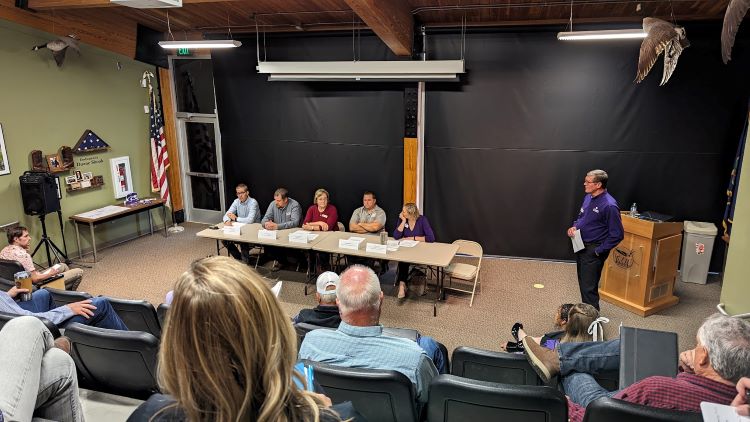April 11, 2024
Community visit spotlight: K-State researchers and students drive change through groundwater quality education in south central Kansas

During the Barton, Ellis, Norton, Smith and Phillips counties regional community visit, Kansas State University highlighted projects and resources that promote good water practices for locals, the region and future generations.
Matthew Kirk, associate professor of geology, is fostering community growth in this area through education. Kirk participated in a community visit panel that highlighted water projects and resources in the Barton County region.
One K-State-led project involves collaboration with Helene Avocat, visiting assistant professor in the geography and geospatial sciences department at K-State; Amanda Alliband and Rick Sloan with Barton Community College; and Sherry Rogers with Dodge City Community College. Students from three institutions worked together to help private well owners in the south central Kansas region.
Kirk led a research project with students focused on monitoring groundwater quality where identification of nitrate contamination issues had previously been reported.
"Students' efforts will help determine the scope of the problem, whether there are any hotspots and how nitrate contamination relates to factors such as land use and aquifer properties," Kirk said.
High nitrate levels can pose significant health risks, especially to vulnerable populations such as pregnant women and infants. Studies have also found that high nitrate levels are linked to a higher risk of diabetes and cancer.
Of the samples collected, students found that about half had nitrate concentrations and were considered unsafe for drinking water. Eresay Alcantar-Velasquez, K-State senior in geology and a research student on the project, said without safe water practices, there could be dire consequences for our environment and overall human well-being.
"Without safe water practices, we can end up exhausting and contaminating our water sources," Alcantar-Velasquez said. "Ultimately, we have to face the consequences as we rely on these water sources in order to survive and thrive as a human population."
Sam Galliardt, K-State senior in environmental science with a minor in chemistry and geology and a research student on the project, also said safe water practices are important for our agricultural system.
"Fresh, drinkable water — groundwater in particular — makes up such a small percentage of all water on Earth, and yet, it is such a necessary resource for humans. Safe water practices are necessary to replenish these resources, such as the Ogallala Aquifer, and for future uses," Galliardt said. "Here in the Great Plains, we use this water for crop irrigation as well, making this water essential for the agricultural prosperity of our region."
Private well owners are largely on their own when it comes to testing for contaminants, and, if necessary, treating their water to improve quality. By sharing these research findings with well owners, this project helps spread awareness of nitrate contamination in the community and helps well owners develop solutions.
Local and state agencies also can use the data collected to identify contamination hotspots and propose policy changes that can address these contamination levels, Kirk said.
"By sharing the findings with the Barton County Conservation District, the Kansas Department of Health and Environment and the Kansas Geological Survey, these entities can translate this research into actionable steps toward improving water quality management," Kirk said. "The data will help inform ongoing efforts and build the capacity for these entities to focus on water quality in the future."
Ultimately, these efforts are a great step in ensuring sustainable use of water resources throughout Kansas.
Many of the students said this project showed the power of connecting research to communities and the valuable skills students gain in real-world experiences.
"I've never participated in the communication of results to a community. As a scientist, it's a very different and sometimes difficult thing to present our work to nonscientists," Galliardt said. "It was great practice to do so at our geopaths presentation, and it was great to see the community members excited about our project, too."
"This experience made me realize why I am so passionate about research," Alcantar-Velasquez said. "Through the knowledge we gain, we have the ability to help others and shape the world into a better place."
Kirk recognizes the importance of applied learning opportunities for students to get a taste of the critical thinking skills that scientists use when they ask and answer questions.
"Those skills will benefit them regardless of where their careers take them," Kirk said. "Moreover, our project provided students with skills they can directly use on the job in the water industry."
Through hands-on learning, students see what environmental issues affect Kansas and how they can work together to solve these challenges in the future. Students gain a better understanding of geoscience, how to conduct research and how to communicate their findings with the public. By bridging the gap between the classroom and community, research empowers and motivates students to become the next generation of leaders in environmental sustainability impacting Kansans' lives.
Explore K-State's regional community visits and engagement partnerships through our StoryMap, or find complete information about regional community visits. K-State faculty, staff or students who are interested or currently immersed in university-community engagement work can contact the Office of Engagement for opportunities to begin or grow their scholarly work.
This article was written by Adelaide Easter, junior in agricultural economics and global food systems leadership with minors in leadership and international agriculture. Easter serves as the intern and Connected 'Cat for K-State's regional community visits.
